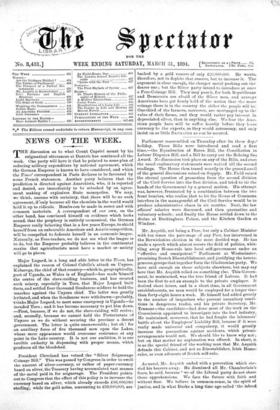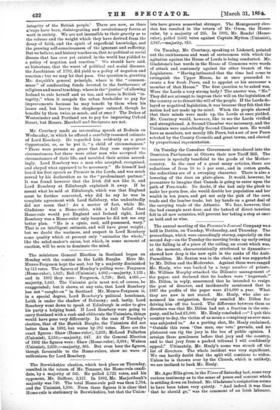As usual, Mr. Asquith ended with a peroration which car-
ried his hearers away. He dismissed all Mr. Chamberlain's fears, he said, because " we of the Liberal party do not share those apprehensions. We face the future with faith and without fear. We believe in common-sense, in the spirit of justice, and in what Burke a long time ago called the inbred integrity of the British people.' There are now, as there always have been, disintegrating and revolutionary forces at work in society. We are not insensible to their gravity or to the volume and the weight which they have derived from the decay of faith, and the spirit of superficial knowledge, and the growing self-consciousness of the ignorant and suffering. But we believe, and history teaches us, that no political or social disease that has ever yet existed in the world has yielded to a policy of negation and reaction." We should have said, as historians, that the worst of political and social diseases. the Jacobinism of 1793, did yield to a policy of negation and reaction ; but we may let that pass. Our question is, granting Mr. Asquith's general principle, where is the " common- sense " of confiscating funds devoted to the furtherance of religious and moral teaching; where is the "justice" of allowing Ireland to rule herself and us too, and where is British "in- tegrity," when it compels the urban freeholder to pay for improvements because he may benefit by them when his leases end, but leaves the shopkeeper untaxed, though he benefits by them twice as much, and at once P The Dukes of Westminster and Portland are to pay for improving Oxford Street, but Messrs. Marshall and Snelgrove are not.



































